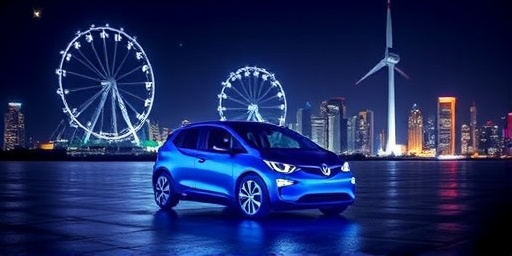In a dramatic shift that’s reshaping the global clean energy landscape, Brazil‘s electric vehicle market is exploding, propelled by massive investments from China and threatening to erode the United States’ longstanding economic edge in sustainable technologies. With EV sales in Brazil surging by over 200% in the past year alone, according to data from the Brazilian Electric Vehicle Association (ABVE), the South American giant is positioning itself as a new frontline in the battle for clean energy supremacy. This boom not only underscores Brazil‘s aggressive push toward sustainability but also amplifies concerns in Washington about losing influence over international green markets to Beijing’s strategic outreach.
- Chinese Firms Pour Billions into Brazil’s EV Manufacturing Hubs
- Brazilian Cities Accelerate EV Adoption Amid Infrastructure Overhaul
- US Economic Interests Face Mounting Pressure from Brazil-China Clean Energy Axis
- Global Supply Chain Shifts Reshape Clean Energy Competition
- Future Horizons: Policy Battles and Innovation Races Ahead
Chinese Firms Pour Billions into Brazil’s EV Manufacturing Hubs
Brazil’s electric vehicles sector is receiving an unprecedented influx of capital from Chinese powerhouses, transforming sleepy industrial zones into buzzing centers of innovation. Companies like BYD and Great Wall Motor have committed over $2 billion to establish local production facilities, with BYD’s Bahia plant alone set to produce 150,000 vehicles annually by 2025. This investment spree is part of China’s broader strategy to secure raw materials like lithium and cobalt from Brazil’s vast mineral reserves while exporting its dominance in battery technology.
“China sees Brazil as a gateway to the Americas for clean energy solutions,” said Dr. Elena Vargas, an economist at the University of São Paulo. “By localizing production, they’re not just selling cars; they’re building an ecosystem that could lock out competitors, including the US.” In fact, recent trade data shows Chinese EV components flooding Brazilian ports, with imports rising 300% year-over-year, per Brazil’s Ministry of Economy reports.
This partnership is yielding tangible results. Factories in states like São Paulo and Minas Gerais are ramping up, creating over 10,000 jobs and training a workforce skilled in advanced battery assembly. Government incentives, including tax breaks under Brazil’s Rota 2030 program, have sweetened the deal, offering up to 30% rebates on investments in green tech. As a result, Chinese brands now hold 60% of Brazil’s nascent EV market share, a figure that’s climbing as affordability improves—average EV prices have dropped 15% thanks to these economies of scale.
Brazilian Cities Accelerate EV Adoption Amid Infrastructure Overhaul
From the bustling streets of Rio de Janeiro to the corporate corridors of Brasília, electric vehicles are becoming a common sight, driven by aggressive urban policies and expanding charging networks. São Paulo, Latin America’s largest city, has mandated that 20% of new public fleet vehicles be electric by 2024, leading to a fleet of over 5,000 EVs already patrolling the metropolis. Nationwide, charging stations have proliferated, with more than 2,500 installed in 2023—a 400% increase—largely funded by Sino-Brazilian joint ventures.
Consumer demand is skyrocketing too. Sales of electric vehicles in Brazil hit 50,000 units last year, up from just 12,000 in 2022, according to ABVE statistics. This growth is fueled by falling battery costs and subsidies that make models like the BYD Dolphin—priced at around $25,000—competitive with gasoline counterparts. Environmental concerns are a key driver; Brazil’s Amazon deforestation crisis has heightened public support for clean energy alternatives, with polls from Datafolha showing 70% of Brazilians favoring EV incentives to combat climate change.
Yet challenges persist. Rural areas lag in infrastructure, and high upfront costs deter lower-income buyers. To address this, the Brazilian government launched a $500 million national charging initiative in partnership with Chinese firm State Grid, aiming to connect 80% of major highways by 2026. “We’re not just importing vehicles; we’re electrifying our future,” proclaimed Environment Minister Marina Silva during the program’s unveiling. This urban-rural divide highlights Brazil’s uneven but determined path toward EV ubiquity.
US Economic Interests Face Mounting Pressure from Brazil-China Clean Energy Axis
The United States, long a leader in clean energy innovation through giants like Tesla and Ford, is watching Brazil’s pivot with alarm, as it risks ceding ground in a market projected to reach $100 billion in Latin America by 2030. American exports of EV components to Brazil have plummeted 25% since 2022, per US Commerce Department figures, as Chinese alternatives undercut prices by up to 40%. This shift is exacerbating tensions in the U.S. economy, where clean energy jobs—numbering over 3 million—face competition from cheaper overseas production.
Fossil fuel stakeholders are particularly vocal. The American Petroleum Institute has warned that Brazil’s EV boom could slash demand for US oil exports, which totaled $15 billion to South America last year. “This isn’t just about cars; it’s about energy security,” stated API President Mike Sommers in a recent congressional hearing. Meanwhile, renewable energy advocates in the US decry the lack of reciprocal incentives, pointing to the Inflation Reduction Act’s $369 billion in green investments as insufficient against China’s state-backed expansion.
Geopolitical ripples are evident too. The Biden administration has initiated talks with Brazil to counter Chinese influence, proposing a “Green Americas Partnership” that includes joint battery research. However, experts like those at the Brookings Institution argue that US tariffs on Chinese EVs—recently hiked to 100%—may inadvertently boost Brazil’s local assembly, further insulating it from American pressure. As one analyst noted, “The US is playing catch-up in a game where China and Brazil are already winning laps.”
Global Supply Chain Shifts Reshape Clean Energy Competition
Brazil’s electric vehicles renaissance is forcing a reevaluation of global supply chains, with profound implications for the U.S. economy’s role in clean energy. China’s control over 80% of the world’s battery production, combined with Brazil’s lithium deposits—estimated at 1.8 million tons—creates a formidable alliance. This duo is diversifying away from US-dominated tech, as evidenced by Brazil’s new trade pacts with the Belt and Road Initiative, which prioritize EV-related infrastructure over traditional Western partnerships.
Economically, this means potential job losses in US manufacturing hubs like Michigan and California, where EV production employs 200,000 workers. A report from the Rhodium Group predicts that without policy changes, US clean energy exports could decline by 15% over the next five years due to Latin American market capture by Asian firms. On the flip side, Brazil benefits immensely: its GDP is forecasted to grow 2% annually from EV-related activities, per IMF projections, bolstering its emergence as a middle power.
Quotes from industry leaders underscore the stakes. Tesla CEO Elon Musk tweeted last month, “Competition is good, but unfair subsidies distort markets—America must innovate faster.” In Brazil, automotive executive Roberto Baptista of Local Motors Brasil echoed optimism: “Chinese investment is a catalyst; we’re building a sovereign clean energy industry that rivals anyone’s.” These dynamics illustrate how Brazil’s boom is not isolated but part of a larger reconfiguration, challenging US hegemony in sustainable tech.
Future Horizons: Policy Battles and Innovation Races Ahead
Looking ahead, the Brazil-China EV collaboration signals a pivotal moment for international clean energy diplomacy, with the U.S. economy poised to adapt or falter. Upcoming WTO discussions on green subsidies could level the playing field, while Brazil’s 2026 elections may solidify pro-EV policies under progressive leadership. Innovations like solid-state batteries, jointly developed by Chinese-Brazilian teams, promise to accelerate adoption, potentially making EVs 50% of Brazil’s new car sales by 2030.
For the US, countermeasures include expanding the CHIPS Act to include battery grants and forging trilateral deals with Brazil to share tech. Analysts foresee a multipolar world where clean energy alliances evolve rapidly—perhaps with Brazil mediating between superpowers. As global emissions targets tighten under the Paris Agreement, this rivalry could spur faster decarbonization worldwide, but only if economic nationalism doesn’t derail collaborative progress. Stakeholders on all sides are bracing for a decade of intense competition, where Brazil’s electric vehicle ascent might just redefine who leads the charge in clean energy.








